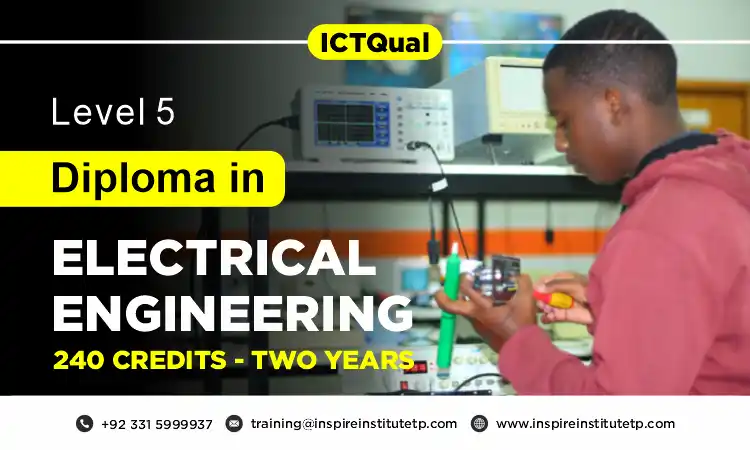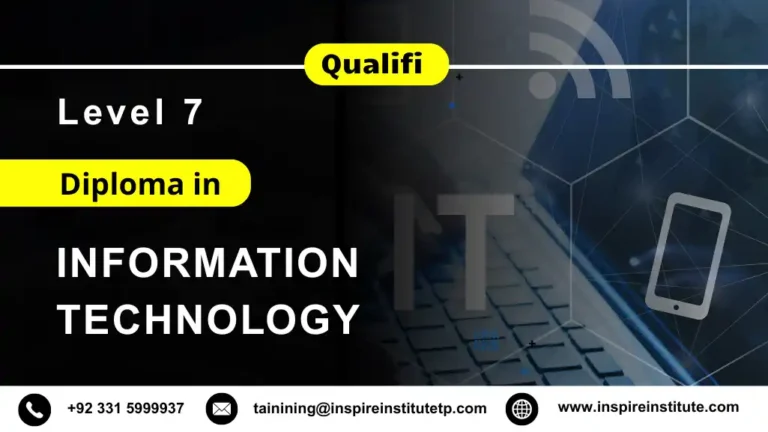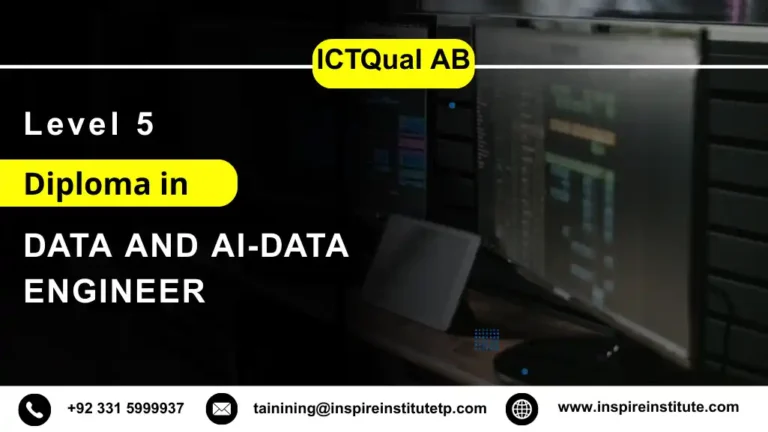ICTQual Level 5 Diploma in Electrical Engineering 240 Credits – Two Years
The ICTQual Level 5 Diploma in Electrical Engineering is a comprehensive two-year program offering 240 credits, designed to equip students with advanced knowledge and practical skills in electrical engineering. The course covers key topics such as electrical circuits, power systems, control systems, electronics, and renewable energy technologies.
Ideal for those aiming to pursue careers in the electrical engineering sector, this diploma prepares students for roles in design, installation, maintenance, and innovation within industries such as energy, telecommunications, manufacturing, and automation. Upon completion, graduates are well-prepared to tackle complex electrical engineering challenges and can further their education with higher qualifications.
Why Choose this Qualification
Choosing the ICTQual Level 5 Diploma in Electrical Engineering offers numerous advantages for individuals looking to advance their career in the dynamic and essential field of electrical engineering. Here’s why this qualification is a great choice:
- Comprehensive Skill Set: The diploma provides a deep understanding of key electrical engineering concepts, including electrical circuits, power systems, control systems, electronics, and renewable energy technologies. You’ll gain both theoretical knowledge and practical skills to excel in this technical field.
- Industry-Recognized Qualification: This qualification is widely recognized by employers in the electrical engineering and technology sectors. Whether you’re seeking a career in energy, automation, telecommunications, or manufacturing, the ICTQual Level 5 Diploma helps you stand out to potential employers.
- Diverse Career Opportunities: Electrical engineering professionals are in high demand across a variety of industries, including energy generation, automation, telecommunications, and construction. Completing this diploma opens up a range of career paths, including roles in design, installation, maintenance, and technical support.
- Focus on Emerging Technologies: The course includes modules on the latest advancements in electrical engineering, such as renewable energy systems and smart grid technologies. This ensures that graduates are equipped to work with cutting-edge technologies that are shaping the future of energy and power systems.
- Practical Hands-On Learning: The ICTQual Level 5 Diploma emphasizes practical, real-world learning experiences. Through lab work, projects, and industry placements, you will develop the hands-on skills required to solve complex electrical engineering problems and meet industry standards.
- Pathway to Further Education: This diploma provides a solid foundation for those wishing to continue their studies at a higher level. Graduates can pursue bachelor’s degrees, specialized certifications, or professional engineering qualifications to further enhance their expertise and career prospects.
- Increased Employability: With the growing reliance on electrical and electronic systems in all sectors of society, the demand for skilled electrical engineers is steadily increasing. By completing this diploma, you enhance your employability and position yourself for long-term career success.
- Global Recognition: The ICTQual Level 5 Diploma in Electrical Engineering is recognized internationally, allowing you to pursue career opportunities both locally and abroad. The skills you acquire are transferable across borders, giving you the flexibility to work in various countries and industries.
- Competitive Edge in the Job Market: As electrical engineering continues to evolve with new technologies, employers seek qualified professionals who can adapt to and implement these innovations. This diploma gives you a competitive edge, preparing you to tackle the latest challenges in the field.
By choosing the ICTQual Level 5 Diploma in Electrical Engineering, you’re investing in a qualification that provides not only advanced technical knowledge but also the practical skills and industry connections needed to thrive in the electrical engineering sector.
Course Overview
Awarding Body:ICTQual AB
Course Level: Level 5
Average Completion Time:
2 year.
Credits Hours : 240
Evidence & Assignment Based
Qualification Structure
Year 1 (120 Credits)
- Introduction to Electrical Engineering
- Engineering Mathematics
- Basic Circuit Analysis
- Electrical Machines and Transformers
- Digital Electronics
- Electrical Power Systems Fundamentals
- Electromagnetic Principles
- Health and Safety in Engineering
- Physics for Electrical Engineers
- Technical Drawing and CAD for Electrical Systems
- Introduction to Renewable Energy Systems
- Communication and Professional Skills
Year 2 (120 Credits)
- Advanced Circuit Design
- Power Electronics
- Control Systems Engineering
- Electrical Machines and Drives
- High Voltage Engineering
- Energy Management and Power Distribution
- Microcontroller and Microprocessor Systems
- Automation and Industrial Control Systems
- Instrumentation and Measurement
- Electrical System Protection and Relaying
- Project Management for Engineers
- Capstone Project in Electrical Engineering
Who Should Take This Course
The ICTQual Level 5 Diploma in Electrical Engineering is ideal for individuals who are passionate about technology, innovation, and solving complex electrical challenges. This qualification is particularly suited for:
- Aspiring Electrical Engineers: If you want to pursue a career in electrical engineering, this diploma provides the foundational and advanced knowledge required for roles in various sectors, including energy, telecommunications, and automation.
- Current Engineering Professionals: Individuals already working in related engineering fields, such as mechanical or civil engineering, who wish to specialize in electrical engineering to enhance their skill set and expand their career opportunities.
- Graduates in Related Fields: If you have a Level 4 qualification (such as an HNC or NVQ) in electrical engineering, electronics, or a related field, this diploma will help you build on your existing knowledge and gain more in-depth, practical expertise.
- Technically-Inclined Individuals: Those with a strong interest in electronics, circuits, power systems, and renewable energy technologies who want to work on cutting-edge projects involving the design, installation, and maintenance of electrical systems.
- Career Changers: Professionals in other industries who are looking to transition into electrical engineering. This qualification offers a comprehensive and structured pathway into the field, providing the technical skills needed to succeed.
- Technicians and Tradespeople: Electricians, electrical technicians, or those working in similar technical roles who want to formalize their qualifications and take on more advanced roles in electrical system design, analysis, or management.
- Individuals Interested in Renewable Energy: The growing field of renewable energy requires skilled engineers to design and maintain energy-efficient systems. This diploma includes relevant coursework in renewable energy technologies, making it ideal for those interested in sustainable engineering practices.
- Those Looking for Further Education: The ICTQual Level 5 Diploma in Electrical Engineering serves as a stepping stone for those who want to pursue higher education, such as a bachelor’s degree in electrical engineering or related areas. It provides the knowledge and skills needed to progress academically.
- Students Interested in International Opportunities: Given that the qualification is recognized globally, this course is ideal for individuals looking to work abroad or gain international recognition in the electrical engineering industry.
This course is for anyone who wants to enter or advance in the electrical engineering field, whether you are starting your career, looking to specialize, or aiming to build on your existing skills and experience.
Course Benefits
The ICTQual Level 5 Diploma in Electrical Engineering offers numerous benefits that make it a valuable qualification for individuals looking to advance their careers in electrical engineering. Here are the key benefits of this course:
- Comprehensive Knowledge and Skill Development:
The diploma provides in-depth knowledge of core electrical engineering concepts, including electrical circuits, power systems, control systems, electronics, and renewable energy technologies. You’ll gain both theoretical understanding and practical skills that are essential for solving real-world engineering challenges. - Industry-Relevant Training:
The course is designed to meet the needs of the ever-evolving electrical engineering industry. You’ll learn about the latest technologies and techniques in areas like smart grid systems, automation, and sustainable energy solutions, ensuring that you stay ahead of industry trends. - Hands-On Practical Experience:
The program emphasizes practical learning through lab sessions, projects, and fieldwork. This hands-on approach helps you apply your theoretical knowledge in real-world scenarios, preparing you for technical roles in the industry. - Pathway to Advanced Career Opportunities:
This diploma opens up a wide range of career paths, such as electrical engineer, control systems engineer, power systems designer, or renewable energy consultant. With the skills gained from the course, you will be well-prepared to work in industries like energy, telecommunications, manufacturing, and construction. - Enhanced Employability:
Graduates of this course are highly sought after by employers due to the practical skills and industry-specific knowledge they gain. The demand for skilled electrical engineers continues to grow, particularly in the renewable energy and automation sectors, making this qualification a valuable asset in a competitive job market. - Global Recognition:
The ICTQual Level 5 Diploma in Electrical Engineering is internationally recognized, allowing you to pursue career opportunities both locally and globally. This gives you the flexibility to work in various countries and industries, further expanding your career options. - Focus on Renewable Energy and Sustainability:
As sustainability and renewable energy become increasingly important, this course includes modules on green energy solutions, such as solar power, wind energy, and energy-efficient systems. Graduates will be equipped to contribute to the transition toward sustainable energy solutions. - Pathway to Further Education:
The diploma provides a solid foundation for further studies, including bachelor’s degrees in electrical engineering or related fields. It also opens up opportunities for specialized certifications and professional qualifications, allowing you to deepen your expertise in specific areas of electrical engineering. - Competitive Edge in the Job Market:
By acquiring advanced technical skills and knowledge, you will have a competitive edge when applying for jobs in electrical engineering. The comprehensive curriculum ensures that you are well-prepared to tackle the complexities of modern electrical systems, making you an attractive candidate for employers. - Flexible Learning Options:
Many institutions offer flexible learning formats, including part-time, online, and blended study options, allowing you to balance your education with work or other commitments. This flexibility makes it easier to pursue the qualification while maintaining your professional or personal responsibilities.
By completing the ICTQual Level 5 Diploma in Electrical Engineering, you will not only gain essential technical skills and practical experience but also enhance your career prospects in the dynamic field of electrical engineering. Whether you’re starting your career, looking to specialize, or aiming for further academic study, this qualification provides the tools you need for success.
Eligibility Criteria
Eligibility Criteria for this course may vary depending on the institution offering it. However, typical requirements include:
Minimum Qualification: A Level 4 qualification (e.g., HNC, NVQ Level 4, or equivalent) in a related field such as electrical engineering, electronics, mathematics, physics, or a science-based discipline.
Strong Foundation in Electrical Engineering: A solid background in electrical engineering principles, mathematics, and physics is highly recommended, as the course builds on these foundational skills and explores advanced topics in electrical engineering.
Minimum Age: Applicants must be at least 18 years old.
Proficiency in English: Strong command of English is essential, as the program involves technical terminology, written assignments, and effective communication in electrical engineering contexts.
Mathematics and Physics Knowledge: A solid understanding of mathematics and physics is crucial, as these subjects are foundational for electrical engineering problem-solving, system design, and analysis.
Prior Experience (Optional): While not mandatory, prior experience in electrical engineering, technical projects, or a related industry can provide a strong foundation and enhance the overall learning experience in the course.
Qualification Route
Route for Candidates with No Experience
This route is ideal for learners who are new to the Electrical field and do not have prior work experience. The process is as follows:
- Admission: The candidate enrolls in the program at an ICTQual Approved Training Centre.
- Training: The learner undergoes formal training, covering all the essential study units. Training will include both theoretical instruction and practical activities.
- Assessment: Learners will be required to complete and submit assignments based on the course’s learning outcomes. These assignments will test the learner’s understanding and application of the course material.
- Certification: After successfully completing the required assignments and assessments, the learner will be awarded the ICTQual Level 5 Diploma in Electrical Engineering.
Route for Experienced and Competent Candidates
For candidates who already have relevant work experience in the Electrical industry, the following route is available:
- Eligibility: The candidate must have at least 5 years of verified experience in civil engineering or a related field. This experience must be relevant to the learning outcomes of the qualification.
- Assessment of Competence: The candidate does not need to undergo the full training program. Instead, the ICTQual Approved Training Centre will assess whether the candidate’s existing knowledge and skills align with the learning outcomes of the course.
- Evidence Submission: The candidate must submit documentation and evidence of their work experience to demonstrate competence in the required areas. This can include job roles, responsibilities, and tasks performed that align with the learning outcomes of the course.
- Knowledge and Understanding: Centres must ensure that the candidate is familiar with all the course’s learning outcomes. If necessary, a skills gap assessment may be conducted to determine if any additional learning is required.
- Certification: Upon successful verification of experience and competence, the candidate will be awarded the ICTQual Level 5 Diploma in Electrical Engineering without having to complete the full training course.
Both routes ensure that candidates either gain the necessary knowledge through training or demonstrate their existing competency to achieve the ICTQual Level 5 Diploma in Electrical Engineering. This flexible approach caters to both new learners and experienced professionals seeking formal certification.







